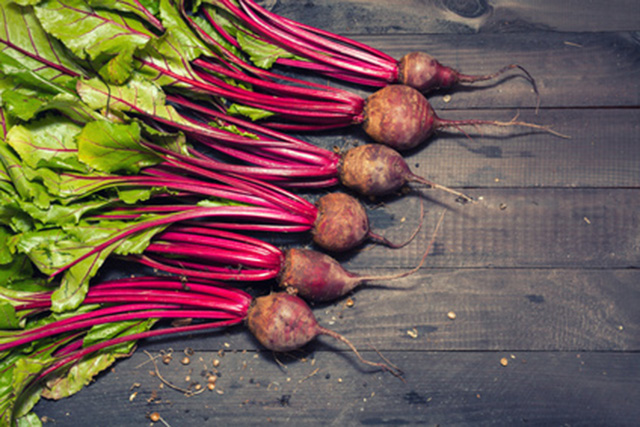Beets come in a variety of colors, from red, white to gold. They are a root vegetable, much like carrots, and have a sweet flavor. They are champions when it comes to their potent health benefits hence there are many reasons to eat beets.
Beets are considered a multi-purpose vegetable, because the roots and the leaves are both edible.
Although beets are typically considered a winter vegetable, they have a earthy taste in the summer along with some sweetness.
Let’s look at 10 reasons to eat beets.
Anti-inflammatory:
The phytonutrients in beets have shown anti-inflammatory properties. Three specific compounds betanin, isobetanin, and vulgaxanthin have especially shown these benefits. They stop the activity of cyclo-oxygenase enzymes, which are the inflammation messengers in our bodies. Inflammation is considered a major risk factor for heart disease, type 2 diabetes, arthritis, and more.
Antioxidant rich:
Beets are loaded with antioxidants such as beta-carotene, vitamin C, and manganese. Antioxidants protect the body from the effects of oxidative stress, which may help strengthen the immune system and ward off diseases. Dr. Andrew Weil explains, “Oxidative stress is the total burden placed on organisms by the constant production of free radicals in the normal course of metabolism plus whatever other pressures the environment brings to bear (natural and artificial radiation, toxins in air, food and water; and miscellaneous sources of oxidizing activity, such as tobacco smoke).” The effects of oxidative stress are often linked to chronic illnesses such as heart disease and many types of cancers.
Aphrodisiac:
Beets were used in ancient times by the Romans as a natural aphrodisiac. They contain boron, which is linked to the production of human sex hormones.
Brain health:
“There have been several very high-profile studies showing that drinking beet juice can lower blood pressure, but we wanted to show that drinking beet juice also increases perfusion, or blood flow, to the brain,” Daniel Kim-Shapiro, PhD, director of the Translational Science Center at Wake Forest University, shares.
Researchers from the Translational Science Center looked at how dietary nitrates affected 14 adults aged 70 and older over a four-day period.
MRI scans showed that after eating a high-nitrate diet, the older adults had increased blood flow to the white matter of the frontal lobes, which are the areas of the brain most commonly associated with the degeneration that leads to dementia and other cognitive conditions.
Contain Betalains and help detox:
Beets contain betalains, which are the pigments that give beets their colors. These potent pigments help promote optimal health. They work as antioxidant an anti-inflammatory agents. Betalains help the body by neutralizing toxins and supporting the cell’s natural detoxification process. They prevent toxins from accumulating in the body and flush them out through urine.
Great source of folate:
Folate, also known as folic acid, “is one of eight total B vitamins and is needed for the formation of red and white blood cells in the bone marrow, the conversion of carbohydrates into energy and the production of DNA and RNA,” according to Medical News Today. Folate is also essential for lowering the risk of heart disease and stroke. One cup of beets contains 148 mcg of folate, which is 37 percent of the recommended daily value.
Lower blood pressure:
In 2010 UK researchers revealed that nitrate is the special ingredient in beetroot which lowers blood pressure and may help to fight heart disease.
The study was funded by the British Heart Foundation and is published online in the American Heart Association journal Hypertension.
May fight cancer:
Because of the high antioxidant levels and anti-inflammatory properties of beets, there is a great chance that they are useful in the reduction of the risk of many types of cancers. We are hoping for large-scale human studies before beets can be considered a food that reduces cancer risk.
Rich in vitamin C:
Beets are a good source of vitamin C, with 6.7 mg per cup, which is 11 percent of the recommended daily value. Vitamin C is believed to have potent immune boosting properties. It is also essential for creating collagen in bones, cartilage, muscle, and blood vessels. Collagen is the main protein in the structure of connective tissues.
Weight loss:
Beets contain only 58 calories in one cup. They are also devoid of fat. Beets are high in dietary fiber, providing 15 percent of the recommended daily value in a single cup. Eating fresh vegetables that are high in dietary fiber, low in calories, and low in fat is key to weight control.
Note: None of the information in our website is intended to diagnose, treat, cure or prevent any illness or disease. The content on our website is for educational purposes only.
For the health benefits of beets.
For a miracle juice with beets.
REFERENCES:
1. “Stumped by Oxidative Stress?” DrWeil.com. WEIL, n.d. Web. 29 Jun 2015.
2. “Lovebeetroot.co.uk.” Web. 29 Jun 2015.
3. “American Heart Association journal Hypertension.” Web. 29 Jun 2015.
4. “Beetroot could help tackle high blood pressure“. Web. 29 Jun 2015.
5. “Drinking beetroot boosts healthy brains“. Daily Mail, November 3 2010. 29 Jun 2015.
6. “Acute effect of a high nitrate diet on brain perfusion in older adults”. Nitric Oxide, October 15 2010. Web. 29 Jun 2015.
7. “Nutrition Facts and Analysis for Beets, Raw.” Self Nutrition Data. Self Nutrition Data, n.d. Web. 29 June 2015.
8. “What Are the Health Benefits of Folate?” Medical News Today. MediLexicon International, n.d. Web. 29 June 2015.


















Pingback: Beet and fennel insomnia relieving juice